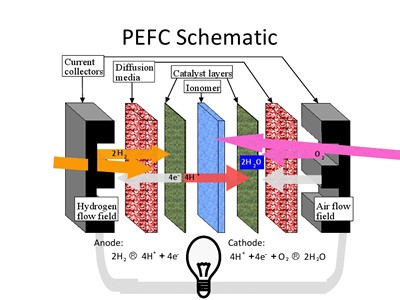DOE Award for Research to Evaluate Fuel Cell Technology

The Department of Energy has awarded up to $1.9 million to a research team led by EETD's Eric Masanet to develop "total cost of ownership" models for low- and high-temperature stationary fuel cell systems up to 250 kilowatts. The work will support research and development efforts for fuel cells by assessing the impact of state-of-the-art manufacturing technologies, system designs, and deployment strategies on the life-cycle cost of fuel cells in emerging markets. Other participating Lawrence Berkeley National Laboratory (Berkeley Lab) researchers include EETD's Adam Weber, Max Wei, James McMahon, and Michael Tucker, and scientists at UC Berkeley and Ballard Power Systems.
The fuel cell research is an example of how Berkeley Lab, through its Carbon Cycle 2.0 program, is weaving together its development of cleaner energy technologies with R&D to evaluate the potential costs, benefits and impacts on energy, materials, and climate change of these technologies.
To encourage more cost-effective design, production, and deployment of fuel cells for stationary applications, researchers, and manufacturers need a better understanding of the total life-cycle costs and benefits of this "cleaner" technology option. The team will develop a total cost of ownership (TCO) approach and model for analyzing the life-cycle cost and environmental aspects of fuel cell designs, which can be used to optimize fuel cell systems for maximum economic and energy system benefits. TCO has not been applied to fuel cells much in the past.
"Analyzing the markets, performance, design and manufacturing options, societal benefits, and life-cycle costs of stationary fuel cell technologies will help manufacturers design better technology for specific markets, customers understand the costs and benefits of investing in the technology, and policymakers provide more effective incentives," says Masanet.